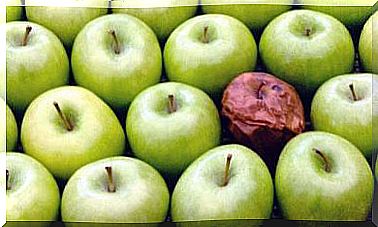Keys To Differentiate Real Hunger From Emotional Hunger

We have all heard of emotional eating. They may even have told us phrases such as: “You are not hungry, you are just bored “. Maybe at some point we have felt identified with this concept and perhaps also felt overwhelmed by the state itself. Therefore, we are going to know the main keys to differentiate real hunger from emotional hunger.
Emotional hunger consists of using food as an aid to regulate our mood. That is to say, the intake loses its original meaning: to nourish ourselves with those elements that we need for our physical performance.
In many situations, sadness, anger, frustration, or disappointment overwhelm and overwhelm us. And if we do not have the personal tools and resources to deal with them, it is easy and tempting to resort to eating food to appease the discomfort.
We have to remember that, when consuming certain types of food, we activate the reward circuit of the brain, which gives us pleasant sensations.
However, this well-being is temporary and sooner or later the latent difficulty reappears. Only this time accompanied by the feeling of guilt for having eaten more than necessary. To stop the cycle of emotional eating, we must be able to recognize it and act accordingly.

How to differentiate real hunger from emotional hunger?
Next, we are going to explore some differentiating characteristics of real hunger and emotional hunger. These will help us to identify if we are facing one or the other.
Real hunger
- It is emerging gradually and increasing over time.
- Hunger originates in the stomach, since it is a physiological sensation.
- We are aware of what we are going to eat, we can control and plan it. We have the ability to select what type of food we want to consume at that time.
- We generally opt for nutritious foods, healthy and balanced dishes that give us satiety.
Emotional hunger
- It appears suddenly, sharply and abruptly. From one moment to the next we feel this sudden craving to eat that we need to satisfy immediately.
- It does not originate in the stomach, as it is not a physiological sensation. It originates in the mind from certain images or mental representations of food. That is, when thinking or imagining a type of food, the impulse acquires such force that you lose control.
- The diet becomes chaotic . An automatic and uncontrolled intake is carried out, without measuring quantities or selecting foods deliberately. You eat on impulse, out of necessity, in large quantities and without a premeditated choice.
- In general , hypercaloric and ultra-processed foods are consumed, high in fats and sugars and with little nutritional value. These foods, in addition to being harmful, do not satisfy us or they do so for very short periods of time.

How can we avoid emotional eating?
As we can see, the differences between the two concepts are clear and obvious. If we pay attention to the signs, it will be easy for us to understand what kind of hunger we are dealing with. Now, what can we do once emotional hunger is recognized?
First of all, stay alert. When you feel hungry, stop and try to identify what type it is, following the parameters above.
Next, it would be very beneficial to make a record in which you can write down what situations or emotions arouse emotional hunger in you. Some people turn to this type of diet to calm their anxiety, others to stop experiencing sadness or emptiness.
Once the triggering emotions have been identified, it is time to acquire or develop healthier coping strategies. You can resort to meditation, diaphragmatic breathing, therapeutic writing…. Any option that helps you process that uncomfortable emotional state will be appropriate.
Above all, give food back its function. Remember and tell yourself that they are the fuel of your body and not the shortcut of your mind so as not to face the pain.
To do this, make the firm decision to disconnect food from your emotional states. When you feel that your emotional balance is compromised, put into practice a more functional and healthy alternative. Of course, in case the situation overtakes you, you can always turn to a professional.









